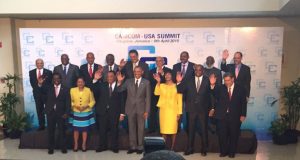PRESIDENT Donald Ramotar yesterday joined other regional leaders for a historic meeting with United States (US) President, Mr Barack Obama in the Jamaican capital, Kingston.President Ramotar later reported that besides joining colleague regional leaders in congratulating their US counterpart for the steps he’s taken to improve bilateral relations with Cuba, they also discussed with him Cuba’s current status in this new dispensation, having been once

classified by the US as a state sponsor of terrorism.
He said that leaders and representatives of the 15 countries in the Caribbean Community (CARICOM) also discussed competitiveness, financial aid, agricultural and technical assistance, and renewable energy, to which latter subject President Obama pledged to contribute US$20M in technical assistance.
The topic of security, encompassing issues such as combatting the illicit drug trade which affects many nations was also discussed.
Meanwhile, with respect to the issue of US-Cuba relations, President Obama reportedly said that the US State Department has completed its review of whether or not to remove Cuba from the aforementioned list of nations, but that he has not yet been in receipt of a final recommendation, and as such was not ready to pronounce on the matter.
“Our emphasis has been on the facts,” was all he was apparently prepared to say on the matter of considering Cuba’s removal from the State Department’s terrorism list, where it has remained for more than 30 years.
Removing it would clear a major obstacle to the re-establishment of diplomatic relations, as the two former political foes advance towards the closest they have ever been in half-a-century.
The review was ordered by President Obama back in December 2014, when he and Cuba’s President Raúl Castro agreed to restore diplomatic ties and move toward normal relations.
The State Department looked at whether Cuba had engaged in terrorism activity in the last six months, the criteria for designating a country as a State sponsor of terrorism.
President Obama said that the State Department’s determination was now going through an inter-agency review that has not yet been finished. “There’s a process involved,” he said, adding, “I won’t make a formal announcement today about what those recommendations are until I receive them.”
In October 1960, the US imposed a financial, economic and commercial blockage on Cuba after the Spanish-speaking country nationalised US-owned Cuban oil refineries.
Meanwhile, leaders, and or their representatives are expected to attend the Seventh Summit of the Americas, which, for the first time, will see participation by all 35 countries in the Western Hemisphere, including Cuba, in Panama City from April 10 to 11. (GINA)



.jpg)








